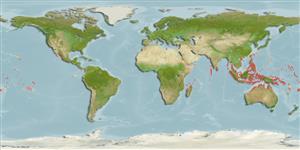>
Gobiiformes (Gobies) >
Oxudercidae (Mudskippers) > Periophthalminae
Etymology: Periophthalmus: Greek, peri = around + Greek, ophthalmos = eye (Ref. 45335).
Environment: milieu / climate zone / depth range / distribution range
Ecologia
marinhas; estuarina associadas(os) a recifes; intervalo de profundidade 0 - 2 m. Tropical; 30°N - 20°S
Indo-Pacific: East Africa to Samoa.
Tamanho / Peso / Idade
Maturity: Lm ? range ? - ? cm
Max length : 14.1 cm SL macho/indeterminado; (Ref. 7050)
Descrição breve
Chaves de identificação | Morfologia | Morfometria
Espinhos dorsais (total) : 8 - 16; Raios dorsais moles (total) : 10 - 12; Espinhos anais: 1; Raios anais moles: 9 - 11. Differs from P. argentilineatus by lacking thin silvery bars ventrally on the sides and having pelvic fins connected at the base by a low membrane (Ref. 37816); further characterized by: frenum of pelvic fins vestigial, but visible macroscopically; pelvic fins united by membrane for about one half their length; D1 height moderate, its margin rounded, black stripe inframarginally with numerous white spots proximally, no elongate spines; D2 with single dusky stripe inframarginally; dorsal fins not connected by membrane; D1 with 11-15 spines; longitudinal scale count 66-86; head width 16.5-22.5% SL; pelvic fin length 13.1-15.4% SL; length of anal fin base 15.9-18.7% SL; length ofD2 base 18.5-23.8% SL; total D2 elements 12-13; total analfin elements 11-12; TRDB 18-22 (Ref. 5218).
Facultative air-breathing (Ref. 126274); Amphibious air-breather (Ref. 31184) that spends most of its time out of the water; able to meet its oxygen requirements as long as it stays wet. Typically resting on mud, rocks, or mangrove roots with their tails dipped in the water. Active at low tide and hunt in the intertidal zone for invertebrates; feeds on worms, crustaceans, and insects as well as polychaetes living on or near surface (Ref. 92840)
Life cycle and mating behavior
Maturidade | Reprodução | Desova | Ovos | Fecundidade | Larvas
Murdy, E.O., 1989. A taxonomic revision and cladistic analysis of the oxudercine gobies (Gobiidae: Oxudercinae). Rec. Aust. Mus., Suppl. 11:1-93. (Ref. 5218)
Categoria na Lista Vermelha da IUCN (Ref. 130435: Version 2024-1)
Ameaça para o homem
Harmless
Utilização humana
Pescarias: sem interesse
Ferramentas
Relatórios especiais
Descarregue XML
Fontes da internet
Estimates based on models
Preferred temperature (Ref.
123201): 26.1 - 29.3, mean 28.6 °C (based on 1953 cells).
Phylogenetic diversity index (Ref.
82804): PD
50 = 0.5000 [Uniqueness, from 0.5 = low to 2.0 = high].
Bayesian length-weight: a=0.01096 (0.00514 - 0.02340), b=2.97 (2.79 - 3.15), in cm total length, based on LWR estimates for this Genus-body shape (Ref.
93245).
Nível Trófico (Ref.
69278): 3.3 ±0.40 se; based on food items.
Resiliência (Ref.
120179): Elevada, tempo mínimo de duplicação da população menor que 15 meses (Preliminary K or Fecundity.).
Fishing Vulnerability (Ref.
59153): Low vulnerability (10 of 100).
Nutrients (Ref.
124155): Calcium = 101 [50, 213] mg/100g; Iron = 0.707 [0.341, 1.334] mg/100g; Protein = 18.9 [17.0, 20.6] %; Omega3 = 0.117 [0.050, 0.233] g/100g; Selenium = 12.3 [6.0, 25.4] μg/100g; VitaminA = 137 [35, 497] μg/100g; Zinc = 2.15 [1.40, 3.27] mg/100g (wet weight);
